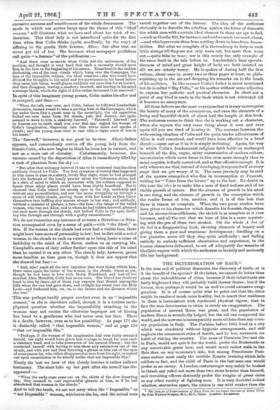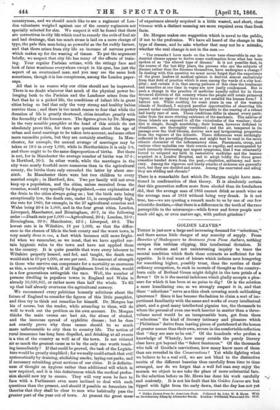THE DETERIORATION. OF RACE: 1 ' - 164ln true'end of political discussion the-discovery
of truth; or is it the benefit of the species?' If the-latter, we cannot do better-than abuse the unhealthiness of cities, because if theirinhabitants are fairly'frightened they will probably build decent drains ; but if the former, then. perhaps it would be- as well' to avoid excessive exag- geration. It- is: of course. quite- wise to point out that the cities might be rendered much more healthy, but to assert that residence in them is inconsistent with continued physical vigour, that in fact the race deteriorates in; cities, is surely an exaggeration. The population of ancient Rome was great, and- the population. of modern Rome is wretchedly lodged; but the old one. conquered the world, and the new-one is incomparably more-athletic than any coun- try population in Italy. The Parisian before 1805 lived in a city which was absolutely without hygienic. arrangements, and still neglects the commonest rules of health; and he has, moreovsen, no habit of visiting the country: The' mass of Parisians live middle in. Paris, wouldsnot quit it for the world, prefer the Boulevanissto any conceivable. green lane; and would much rather: welkin the Bois than on: any-mountain's side, but among Frenchmen, Path- sians endure most easily the terrible Zouave training which: kills soldiers so fast, and the child. of Paris is the lastman. one would prefer as an enemy. A London costermonger may safely' be backed to thrash any yokel not more than two stone heavier than himself; and recruiting officers distinctly prefer the- roughs of groat cities to any other variety of fighting men. It isvery doubtful. indeed whether, starvation-apart, the citizen is one. whit weaker.than:the The Danger of Deterioration of Race from the too rapid Increase of Great Mies. By Jolla Edward alorgau, Biza, M. D.,.Ozon. London:: Longman..
countryman, and we should much like to see a regiment of Lon- don volunteers weighed against one of the county regiments not specially selected for size. We suspect it will be found that there are correctives in city life which tend to remedy the evils of foul air and bad drainage, that too much stress is laid on a mere change of type, the pale thin man being as powerful as the fat ruddy farmer, and that there arises from city life an increase of nervous power which makes up for the wasting of tissues. To put the argument briefly, we suspect that city life has many of the effects of train- ing. Your regular Parisian artizan, with the stringy face and look of faint weariness everywhere except in his eyes, has just the aspect of an overtrained man, and you may see the same look sometimes, though it is less conspicuous, among the London paper- caps.
All that is no reason why our cities should not be improved. There is no doubt whatever that much of the physical power be- longing both to the Parisian and the Londoner arises from the fact that he is a picked life, the conditions of infant life in great cities being so bad that only the very strong and healthy babies survive them ; and there is too much reason to fear that while the duration of life is greatly shortened, cities interfere greatly with the fecundity of the human race. The figures given by Dr. Morgan in the very sensible pamphlet at the head of this article do not absolutely prove this, for there are questions about the age of urban and rural marriage to be taken into account, and some other more recondite points, but they are certainly startling. In Man- chester, for example, the annual average of marriages may be taken at 18.5 in every 1,000, while in Hertfordshire it is only 5.8, and there ought to be the same disproportion of births. But there is not, for in Manchester the average number of births was 37.5 ; in Hertford, 30.5. In other words, while the marriages in the city were nearly fourfold more numerous than in the agricultural county, the births there only exceeded the latter by about one- sixth. In Manchester there were but two children to every married couple ; in Hertford, five. Two per family will not even keep up a population, and the cities, unless recruited from the counties, would very speedily be depopulated,—one explanation of the drain to the cities always going on ; but the birth rate being exceptionally low, the death rate, under 15, is exceptionally high, the rate for 1860, for example, in the 27 agricultural counties and Wales being 20.4 in 1,000, and in the four great cities, London, Liverpool, Manchester, and Birmingham, 40/, in the following order :—Death rate per 1,000 :—Agricaltural, 20.4; London, 33.0 ; Birmingham, 39.0 ; Manchester, 42.5 ; Liverpool, 48.5. The lowest rate is in Wiltshire, 18 per 1,000, so that the differ- ence in the chance of life in the best county and the worst town, is very nearly three to one, a fact which becomes still more fright- ful when we remember, as we mast, that we have applied cer- tain hygienic rules to the town and have not applied them to the country. It is quite possible that were every labourer in Wiltshire properly housed, and fed, and taught, the death rate would sink to 10 per 1,000, or one per cent. No amount of strength in those who survive can compensate for a mortality so enormous as this, a mortality which, if all Englishmen lived in cities, would in a few generations extinguish the race. Well, the number of persons dwelling in populous towns in England and Wales is already 10,930,841, or rather more than half the whole. To fill up that half already overtaxes the agricultural nursery.
We recommend every politician honestly solicitous about the future of England to consider the figures of this little pamphlet, and then try to think out remedies for himself. Dr. Morgan has his of course, but the reader, while attending to them, will do well to work out the problem on his own account. Dr. Morgan thinks the main causes are bad air, the abuse of alcohol, and the immense spread of syphilitic disease ; but he does not exactly prove why these causes should be so much more unfavourable to city than to country life. The notion of rural innocence has long been dispelled, and drinking at all events is a vice of the country as well as of the town. Is not vitiated air so much the greatest cause as to be the only one worth touch- ing immediately? If that could be proved, the task of the Legisla- ture would be greatly simplified ; for we really could attack that evil systematically by draining, abolishing smoke, laying out parks, and if necessary rebuilding great sections of our cities. It is definite- ness of thought on hygiene rather than additional will which is now required, and it is this definiteness which the medical profes- sion should now try to ensure. They will very soon be face to face with a Parliament even more inclined to deal with such questions than the present, and should if possible so formulate its theories that they shall be clear to men who habitually pass the greater part of the year out of town. At present the great mass of experience already acquired is a little wasted, and short, clear resumes with a distinct meaning are more required even than fresh facts.
Dr. Morgan makes one suggestion which is novel to the public, if not to the profession. We have all heard of the change in the type of disease, and he asks whether that may not be a mistake, whether the real change is not in the men:— "The remarks I have made on the lower tone observable in our in- dustrial classes appear to derive some confirmation from what has been spoken of as 'the altered type of disease.' Is it not possible that, in the course of the last fifty years, the persons who are the subjects of disease rather than the diseases themselves, have undergone a change ? In dealing with this question we must never forget that the experience of the great leaders of medical opinion is derived almost exclusively from that field of practice which is seen among the wards of a city hos- pital ; and certain it is, that among patients of this class the treatment and remedies at one time in vogue are now justly condemned. But is such a change in the practice of medicine equally called for in those favoured districts of the country where the people still retain primeval vigour, and no signs of decay have as yet assailed the human form? I believe not. While residing for some years in one of the western islands of Scotland, I enjoyed peculiar opportunities of observing life passed under conditions singularly favourable to the rearing of a robust and hardy race of men. Those conditions differ in almost every parti- cular from the more stirring existence of the mechanic. The natives of these islands are exposed to all the vicissitudes of the weather ; their diet is simple, though nourishing; their houses, however deficient in cleanliness, are thoroughly ventilated ; and the air, tempered in its passage over the Gulf Stream, derives new-and invigorating properties from the vapours of the Atlantic. These differences were strikingly reflected in the prevailing diseases, and might beat be read in the more sthenic character of the inflammatory class. Pneumonia, croup, and various other maladies ran their course so rapidly, and accompanied by such intensely distressing and urgent symptoms, that I was reluctantly forced to suspend my faith in restorative medicine and the lessons. acquired in a London Hospital, and to adopt boldly the three great remedies handed down from the past,—depletion, antimony, and mer- cury. Among the vigorous and hardy attacks of sickness are generally rare, but they are decided and acute. Among the enervated and ailing they are abiding and chronic."
There is a remarkable fact which Dr. Morgan might have men- tioned in confirmation of that theory. It is absolutely certain that this generation suffers more from alcohol than its forefathers. did, that the average man of 1866 cannot drink as much wine as the average man of 1816 without being very drunk. Is it not true, too—we are quoting a remark made to us by one of our few scientific dentists,—that there is a difference in the teeth of the race perceptible to the microscope—while fewer and fewer people now reach old age, or even mature age, with perfect grinders ?































 Previous page
Previous page